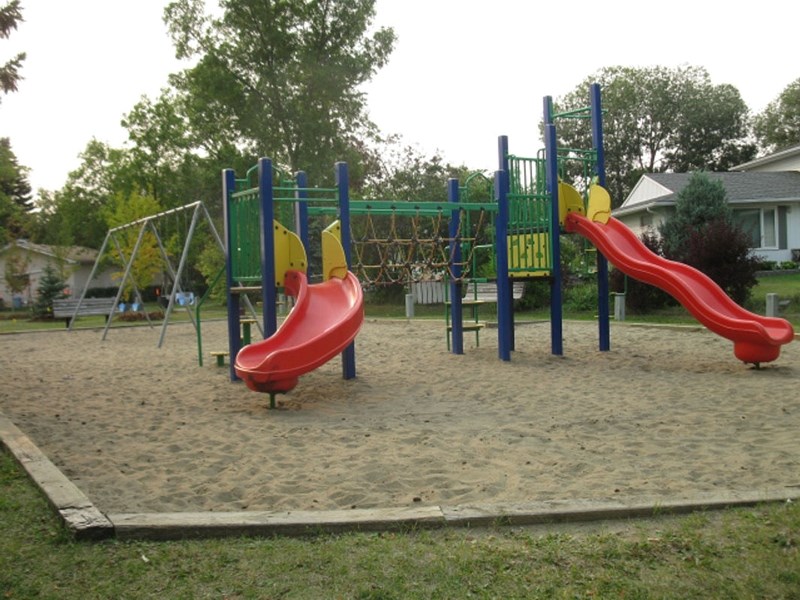A local man with a street named after him is miffed that city crews sprayed herbicides right next to a playground last week.
Lacombe Park resident Basil Delaney called the Gazette this week after he saw crews spraying poplar saplings near his home in a way that violated the city’s integrated pest management guidelines. (Delaney Place is named after him and his wife, Roseanne.)
City crews chopped down several poplar trees near the Langley Park Tot Lot a few years ago as part of the city’s poplar removal program, Delaney said. But because they didn’t grind the stumps properly, the trees were still alive and put out a lot of suckers into the nearby field.
Last Aug. 19, Delaney said he saw a sign posted in the area that said the zone would be sprayed with the herbicide 2,4-D on or after Aug. 21. Crews actually did it on the morning of Aug. 20. The sign was later changed to say that the spraying would happen after Aug. 24.
Delaney says he also saw crews spraying the herbicide right up to the edge of the tot lot’s sandlot. The city’s pest management guidelines say that the city is to maintain a “pesticide-free” buffer zone around all tot lots, playgrounds and swimming pools.
“They were in violation of their own guidelines.”
Delaney says he had to warn several families in the playground about the improper application the day after the spraying. Several of his neighbours are deeply upset about the spraying.
Delaney blasted the city for not following its own rules and for using 2,4-D.
“Why in this city are we applying this chemical when it’s known to be carcinogenic?” he says.
Health Canada is currently doing a health review of 2,4-D in Canada. Several provinces, such as Ontario and Nova Scotia, have banned its use. The World Health Organization ruled that the chemical was “possibly” carcinogenic earlier this year.
City arborist Kevin Veenstra said he investigated the incident and had personally apologized to Delaney about it.
Crews had discovered about 100 poplar suckers in this region and had gone after them with herbicides as part of the city’s turf management program, Veenstra said. When he investigated, he found that they had improperly sprayed 20 saplings within the buffer zone for the playground.
“It was a screw-up,” he said, as they should not have sprayed within 30 metres of the playground. He personally felt terrible that this had happened.
He has since reviewed pesticide rules with his crews and had them remove the saplings manually and properly grind down the stumps.
“In the end, we didn’t need any spray.”
The city’s integrated pest management plan is up for review next year, Veenstra said.
City residents will have a chance next week to tell a provincial panel what the Alberta government should do to fight climate change.
The Alberta Climate Change Advisory Panel is holding an open house this Wednesday at the Chateau Louis Hotel in Edmonton.
Chaired by the University of Alberta’s Andrew Leach, the province-appointed panel is talking to Albertans in order to help the province create a new climate change strategy.
Wednesday’s event will be pretty informal, with experts and panel members available to speak directly with residents about climate change, said Alberta Environment spokesperson Jason Maloney. Visitors will also be able to make written submissions to the panel and take an online survey.
CO2 is a major environmental problem that’s warming the planet, said Leigh Bond of St. Albert’s Threshold Energies. We’re already set to lose the Colombia ice fields due to climate warming, and are almost too late to save other things such as the polar bear.
Bond said he planned to speak to the panel about energy retrofits and home construction.
“Everybody gets caught up in retrofitting old houses and then we continue to build new homes that have to be retrofitted, and it just doesn’t make any sense.”
Bond said other residents should take note of this panel since it’s almost certain to recommend some sort of price on carbon as a way to reduce emissions.
“We’re all going to be affected by a carbon tax,” he said.
The open house runs from 5:30 to 8:30 p.m. this Sept. 2 at 11727 Kingsway Ave. Visit alberta.ca/climate-leadership.cfm to take the panel’s survey and read its discussion paper.




